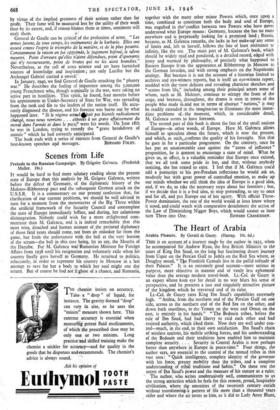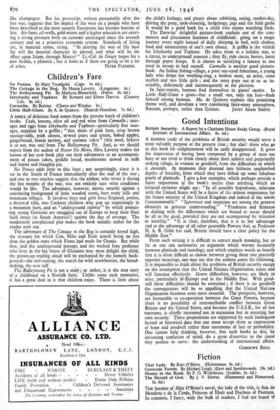The Heart of Arabia
Arabia Phoenix. By Gerald de Gaury. (Harrap. 10s. 6d.)
Tats is an ,account pf a journey made by the author in.1935, when he accompanied Sir Andrew Ryan, the first British Minister to the court of King Ibn Saud, on the long but fascinating desert journey from Uqair on the Persian Gulf to Jedda on the Red Sea where, as Doughty noted, "The Frankish Consuls live in the pallid solitude of their Palaces." It is an extremely good account—more serious in purpose, more objective in manner and of vastly less ephemeral value than the average modern travel-book. Lt.-Col. de Gaury is an expert whose keen eye for detail in no way blurs his sense of perspective, and he presents a just and singularly attractive picture of the kingdom which he traversed and of its ruler.
Lt.-Col. de Gaury rates King Ibn Saud's capabilities extremely high. " Arabia, from the northern end of the Persian Gulf on one side, across to the northern end of the Red Sea on the other, and down both coastlines, to the Yemen on the west and Oman on the east, is entirely in his hands." "The Bedouin tribes, before the rule of Ibn Saud, had had liberty to raid each other and had resisted authority, which irked them. Now they are well under con- trol—much, in the end, to their own satisfaction. Ibn Saud's chain of wireless stations, his mobile striking forces, and his understanding of the Bedouin and their traditions have enabled him to maintain complete security. . . . Security in Central Arabia is now perhaps better than anywhere in Europe in peace-time." Four things, the author says, are essential to the control of the nomad tribes in this vast area: " Quick intelligence, complete identity of the governor with his force, greater mobility than the tribes, and a complete understanding of tribal traditions and habits." On these rest the secret of Ibn Saud's power and the measure of his stature as a ruler. The author, who writes unobtrusively well, communicates to us the strong attraction which he feels for this remote, proud, hospitable civilisation, where thc amenities of the twentieth century enrich without transforming-1 pattern of life more than a thousand years older and where the air tastes to him, as it did to Lady Anne Blunt, like champagne. But his postscript, written presumably after. the • late war, suggests that the impact of the west on a people who have been described as the most easterly Europeans has become heavier of late. Air-lines, oil-wells, gold-mines and a higher education are exert- ing a strong pressure both on customs unchanged since the seventh century and on a primitive economic system. Standards of living are, in material terms, rising. " In altering the way of life how far will the material character be altered, and what will be the effect upon Islam, through Mecca? " Lt.-Col. de Gaury hopes for a new Arabia, a phoenix ; but it looks as if there are going to be a lot































 Previous page
Previous page